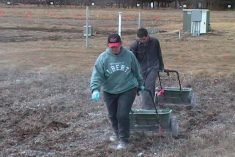Manitoba Farm Women’s Conference showcases how factors such as the local food movement, new entrants, and women’s changing roles are bringing a new excitement to farming
When Leona Dargis and her four sisters chose to continue to farm after their parents’ death five years ago, they knew they were breaking with convention.
The girls, then ranging in age from 15 to 22, were orphaned when a small plane piloted by their father Jean and carrying their mother Joanne crashed Aug. 12, 2007.
Although some doubted the five young women could manage the family’s 4,000-acre mixed grain and cattle farm, they received overwhelming support from their community, Dargis told last week’s Manitoba Farm Women’s Conference.
Read Also

Tie vote derails canola tariff compensation resolution at MCGA
Manitoba Canola Growers Association members were split on whether to push Ottawa for compensation for losses due to Chinese tariffs.
Five years, two high school graduations and one college graduation, and two weddings later, the girls are still supporting each other. Lynn, the second eldest, now runs the farm while Leona, 27 and the eldest, is on a public speaking tour, having earned a Nuffield Canada scholarship and served as a member of the Royal Agricultural Societies of the Commonwealth.
Her travels have given her a new appreciation for the huge role women play in agriculture, she said. Coming back to Canada, she noticed a farming revival in this country, she added.
“Not only do we now have the farm kids and the people who grew up with agricultural roots and have a passion for it coming in, but we also have an interesting dynamic of city people coming into the ag sector,” she said.
“It’s brilliant. It’s exciting. And it’s so encouraging.”
Her talk was a nice fit with the theme of the 2012 conference: the New Face of Rural Life.
We really are starting to see many new faces in agriculture now, said conference chair and Glenboro farmer Abby Wytinck.
They belong not just to farmers’ grown children who are now coming back to farm, but to city-raised women marrying farm boys and bringing new perspectives to rural life, she said. They also belong to a growing number of new farm entrants, too.
“Rural life is changing so much,” she said.
Technology plays a key role
That view was echoed by Faye Fossay, owner of F3 Designs, a web-design company she started in 2006.
Although she helps out her husband when needed, her days at their Woodlands-area farm are mostly spent in front of a computer.
“I’m not actively farming although I live on the farm — I’m not your typical farm wife,” Fossay said during a panel discussion on home-based businesses.
Audience members later stood to assure her that she is, indeed, typical of many women on the farm today.
Other speakers described how embracing the local food movement has enabled them to create businesses selling farm-raised product, either from on-farm stores or at farmers’ markets.
Morden’s Karen Friesen has grown fruits and vegetables and canned product to sell at the Morden Farmers’ Market for five years. Heather Kurbis has been selling free-run eggs, naturally raised meats and vegetables since 2007 off their Beausejour-area farm.
Another conference speaker was Lisa Clouston, a part-time social worker, who farms with husband Greg Wood. She spoke of how they and their three teenaged children have incorporated holistic management practices on their fourth-generation family farm, and now raise grass-fed beef along with rare and heritage breeds. They sell directly from the farm and also operate a meat shop in nearby Cypress River.
“It has really changed our lives,” she said. “I could talk for a whole weekend about it.”
Clouston said she’s also buoyed by the growing interest she’s seeing in farming among younger people and she’s glad to see the growing diversity in the farm community.
“It’s fantastic what’s happening in agriculture right now,” she said. “We need everybody.”
About 130 participants attended this year’s conference, the 26th annual.
Attending the conference now also earns up to 6.5 management training credits through the Bridging Generations Initiative. That’s also helping to attract new faces to the event.
“I’m seeing that there’s a lot more younger women that are here,” said Heather Brown, a Portage la Prairie-area farmer and a conference founder.















